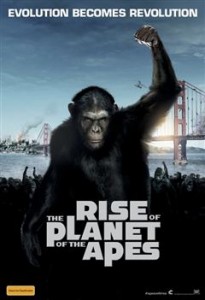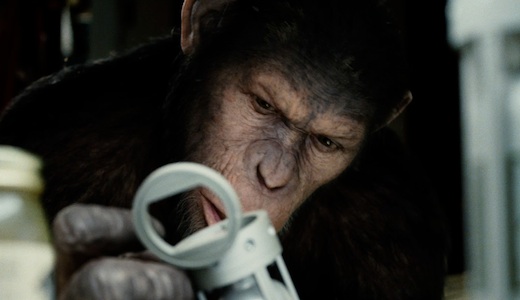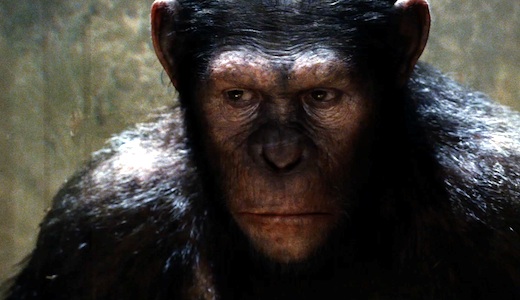 “You blew it up! Damn you. God damn you all to hell!” Despite our unfortunate future, as depicted in the 1968 sci-fi classic The Planet of the Apes directed by Franklin J. Schaffner and starring Charlton Heston, the story evolved through four sequels, two TV series and a Tim Burton re-imagining. Yesterday, we were treated to a sneak peek of about 20 minutes worth of footage from the reboot of the series, Rise of the Planet of the Apes, along with a very special Q & A with special effects guru Joe Letteri (The Lord of the Rings: Return of the King, Avatar, King Kong and the forthcoming The Hobbit).
“You blew it up! Damn you. God damn you all to hell!” Despite our unfortunate future, as depicted in the 1968 sci-fi classic The Planet of the Apes directed by Franklin J. Schaffner and starring Charlton Heston, the story evolved through four sequels, two TV series and a Tim Burton re-imagining. Yesterday, we were treated to a sneak peek of about 20 minutes worth of footage from the reboot of the series, Rise of the Planet of the Apes, along with a very special Q & A with special effects guru Joe Letteri (The Lord of the Rings: Return of the King, Avatar, King Kong and the forthcoming The Hobbit).
We were shown a series of clips from the forthcoming film, which as we were reminded in the introduction by Angela Bishop, has been bumped up from November to August, the height of the American summer season. Not for nothing either: the Apes franchise has an established name, despite a shaky reputation after Burton’s version of it, and the work of WETA Digital on the film has already begun to grab attention from the footage we’ve seen so far. The 20 minutes worth of completed clips we were shown on the day are early indicators that they will only cement WETA’s reputation, with Letteri adding that the work-in-progress has over 1000 effects shots, second only to Avatar.
Minor spoilers ahead. Ye have been warned.
What was particularly interesting about the four or so clips that we were shown were that Fox has chosen to steer away from the sheer action-packed “extended trailer” approach that other previews have given us, but rather chosen a key number of clips that emphasise the emotional impact of the scenes. Thanks to advances in the performance capture/motion capture (or ‘mocap’), the suited performances of actors, later replaced with CG created photorealistic apes, are no longer confined to the studio. Case in point, in the first clip we saw, Will Rodman (James Franco, Your Highness) is taking the super-smart ape Caesar (Andy Serkis, Burke and Hare) on a walk through a park. In the scene, Caesar is confronted with a dog, opens a car door, sits down and through sign-language asks what he is. Here we get our first sense of the stunning amount of detail in the ape characters, with human-like expressiveness and fluid motion now possible from the characters. We are a fair way from Uncanny Valley.
In a second scene, the combination of action and emotion can be seen in the relationship between Caesar and Will’s Alzheimer’s stricken father (John Lithgow, Leap Year), who attempts to drive a neighbour’s car in a befuddled state. Attacked by the aggressive neighbour, Caesar leaps to his defence, swinging through trees, repeatedly pounding the man before biting his finger off. As the police arrive, Caesar curls up reassuringly in the father’s arms. Aside from being a damn fine action sequence, with the CG and motion capture technology requiring hidden cameras all of the set according to Letteri. The only unconvincing thing about the scene was Lithgow’s over-the-top portrayal of an Alzheimer’s sufferer, although WETA’s work is unsurpassed in this thrilling moment.
Although the lead ape Caesar shares a name with the protagonist of the ape revolution in Conquest of the Planet of the Apes, and the ruler of Ape City in the fifth and final film, Battle for the Planet of the Apes (played by Roddy McDowell), the storyline in Rise of the Planet of the Apes appears to bear little relation to those earlier films, short of the connection to the title and the concept of an ape revolution. Yet where those earlier films were based around the idea of an ape traveling back in time to the present day, starting their own predestined chain of events, this new film appears to return to the themes of the 1968 original, in that man is the unwitting creator of his own subjugation. In a sign of the times, it is cell research and the cure of Alzheimer’s (and not the A-Bomb) that is the God-defying tool that brings down mankind by enhancing the intelligence of the apes, showing that while our technologies may have evolved since the 1960s, our fears have not.
The remaining footage we saw, along with some of the uncompleted clips that Letteri introduced, focused largely on the foundations of the ape revolt. Some of these scenes promise to be as spectacular as they are creepy, particularly as Caesar begins to teach the other apes to communicate and work together. The looks of disdain that Caesar slips to the ubiquitous Brian Cox (seriously, he’s in everything at the moment), or the fiery rebellion he displays to one of the keepers (Tom Felton, Harry Potter and the Deathly Hallows – Part 1) are subtle, powerful and indicative of the level of acting that is now possible through these “digital masks”. Indeed, used as they are here, they are more like a skin-tight suit through which the performers can emote and utterly convince the audience that it is apes sharing the screen with the humans. As we have already seen from the trailers, this is building up to a spectacular attack scene on the Golden Gate Bridge, although we only saw glimpses of this on the day.
During the final questions, Letteri was asked if he foresaw a day when humans could be replaced by the technology on display in Rise of the Planet of the Apes, including the likes of Marilyn Monroe or Humphrey Bogart in modern films. In light of the wondrous creatures that Letteri and his team have created over the last decade, his answer to this was simple: why would you want to?

We would like to thank Fox for inviting us to the special screening and Q & A, and we look forward to bringing you more details on the completed film as they arrive.
Rise of the Planet of the Apes is released on 4 August 2011 in Australia from Fox.
The Reel Bits is the cinema arm of DVD Bits. Richard can be found on Twitter @DVDBits and Sarah @swardplay. The Reel Bits is also @The_ReelBits






No Responses